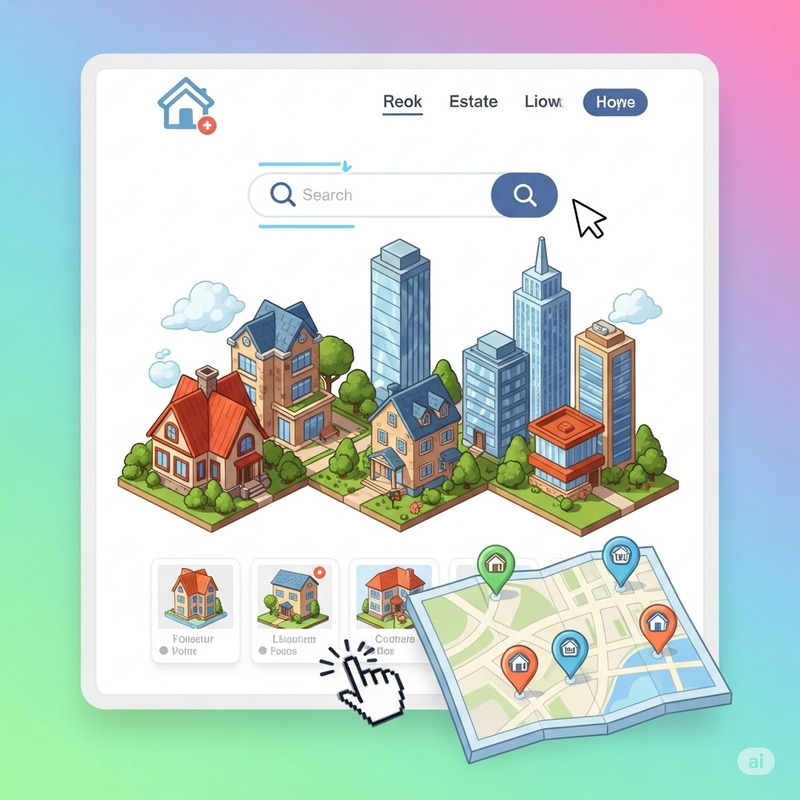The property market in Malaysia is growing with developers vying for attention. Buyers now turn to Google before visiting a sales gallery or calling an agent. Therefore, a well-built website without search visibility is like a show unit with no visitors.
In this digital race, SEO becomes a developer’s most consistent driver of organic leads – helping projects get discovered, trusted, and shortlisted.
Table of Contents
Key Takeaways
- SEO is essential for property developers to increase online visibility, attract qualified leads, and reduce dependency on paid ads.
- High-intent, location-based keywords are the backbone of real estate SEO – focus on what buyers are actively searching for.
- Strong on-page and local SEO practices help boost general and area-specific property search rankings.
- Mobile speed, user experience, and structured content significantly influence how well your site performs in search results.
- Quality backlinks from reputable property-related sources improve authority and trust in Google’s eyes.
- Common mistakes like duplicate content, slow pages, and keyword stuffing can weaken SEO performance.
- Getting started with an SEO audit, keyword plan, content strategy, and analytics setup builds a solid foundation for long-term growth.
Why SEO Matters for the Real Estate Industry

In a digitally driven housing market, SEO plays a crucial role in connecting serious buyers with the right properties.
- Brings in high-quality leads
People searching for specific property terms are often ready to inquire or invest.
- Increases visibility for new projects
Launches, showrooms, and property updates gain more traction when optimised for search engines.
- Reduces reliance on paid ads
SEO builds lasting visibility without continuous ad spending.
- Improves user experience
Optimised websites are easier to navigate, mobile-friendly, and quicker to load, increasing engagement.
- Supports local discovery
Developers can attract interest from specific regions or neighbourhood-based searches with local SEO.
- Gives a competitive edge
In saturated markets, ranking higher helps developers stand out from listing portals and competitors.
7 Real Estate SEO Strategies for Property Sites
Attracting attention in the real estate market requires a solid SEO foundation to ensure that their projects appear when and where buyers are searching. These are the strategies that form the core of a strong online presence:
1. Real Estate Keyword Research

Start by identifying what serious buyers are searching for. Prioritise high-intent, location-specific keywords like “new condo launch KL” or “landed house Shah Alam.”
Use tools like Google Keyword Planner or Ubersuggest to gauge volume and competition. Long-tail keywords offer more targeted traffic and often come with lower competition, which is ideal for niche or project-specific pages.
2. On-Page SEO Optimisation

Each page on your site should be clearly structured and target specific keywords. Optimise page titles, meta descriptions, headers, and image alt text with relevant terms.
Use clean URLs and ensure your content highlights key project details like location, pricing, features, and nearby amenities. Internal linking between related pages also helps search engines crawl your site more effectively.
Want a deeper dive into on-page techniques? Check out this guide on on-page SEO for higher ranking to sharpen your strategy.
3. Local SEO for Property Developers

Most buyers search with a location in mind, so local SEO is important. Optimise your Google Business Profile with accurate NAP (Name, Address, Phone), project photos, and updates.
Embed Google Maps on project pages and include local keywords like “new condo in Subang Jaya.” Add location-based schema markup to help search engines understand your content’s relevance to specific areas.
4. Mobile-Friendly & Fast Website

Today’s buyers expect seamless browsing especially on mobile. Your site should load in under three seconds, display clearly on all screen sizes, and make it easy to explore listings, view galleries, or submit enquiries.
Compress images, streamline scripts, and test performance regularly to keep the browsing experience smooth and frustration-free.
Learn more about the tools to develop effective websites and how to optimise for a mobile-friendly web experience today.
5. Link Building Strategies

High-quality backlinks signal authority to search engines and boost rankings. Secure links from reputable property blogs, news outlets, and local directories.
Publish thought leadership content, collaborate with real estate influencers, and share project updates that others will reference. Press releases for new launches or awards can also attract valuable media coverage and natural backlinks.
6. Optimising Listings & Landing Pages

Each project page should be unique, detailed, and conversion-focused. Include clear descriptions, location highlights, pricing, virtual tours, and enquiry forms.
Use strong headlines and calls-to-action to guide users and avoid duplicating content from property portals to maintain SEO value.
7. Tracking and Analytics

Set up Google Analytics and Search Console to monitor traffic, user behaviour, and keyword performance. Track key actions like form submissions or brochure downloads to measure conversions.
Use these insights to refine content, fix drop-off points, and prioritise pages that drive the most engagement.
Common Mistakes & Real Estate SEO Best Practices
Even the best property websites can underperform if key SEO fundamentals are overlooked. Recognising common mistakes and taking practical first steps can set a stronger foundation for long-term visibility.
| Common SEO Mistake | Why It’s a Problem |
| Duplicate content across listings | Confuses search engines and reduces your site’s ability to rank uniquely |
| Keyword stuffing | Makes content unreadable and can lead to search penalties |
| Ignoring mobile performance | Most users browse on mobile; poor experience results in high bounce rates |
| Slow page speed | Frustrates users and lowers ranking signals in Google’s algorithm |
| Missing meta titles and descriptions | Reduces click-through rates and weakens visibility in search engine results |
| No internal linking structure | Hinders site navigation and makes it harder for Google to crawl important pages |
| Outdated project pages | Signals neglect to users and search engines, reducing site credibility |
How to Get Started with SEO for Your Project
Follow these steps to elevate your online presence:
| Step | Explanation |
| 1. Audit your current website | Identify technical issues, broken links, and underperforming pages using tools like Screaming Frog or Google Search Console. |
| 2. Map out target keywords | Assign relevant keywords to each page based on search intent, location, and property type. |
| 3. Optimise existing content | Update titles, meta descriptions, headers, and on-page content to reflect your chosen keywords. |
| 4. Build a content calendar | Plan regular blog posts, FAQs, and updates around buyer queries, local developments, or market trends. |
| 5. Implement tracking tools | Set up Google Analytics and conversion tracking to monitor user behaviour and measure lead generation. |
Here are some of the tools that you can utilise for your real estate SEO projects:
- Google Search Console
- Google Analytics
- Semrush
- Ahrefs
- Ubersuggest
- Screaming Frog (for site crawling & audits)
- BrightLocal (for local SEO)
Conclusion
Search rankings aren’t built overnight, but for property developers willing to invest in SEO, the payoff is consistent visibility and qualified leads. A well-optimised site works around the clock, guiding potential buyers to your projects before they ever walk into a showroom.
Need help to rank your property projects? Newnormz digital marketing crafts strategies that move the needle—from SEO to content, ads, and beyond. Contact Newnormz and let’s build your online presence with real results.






